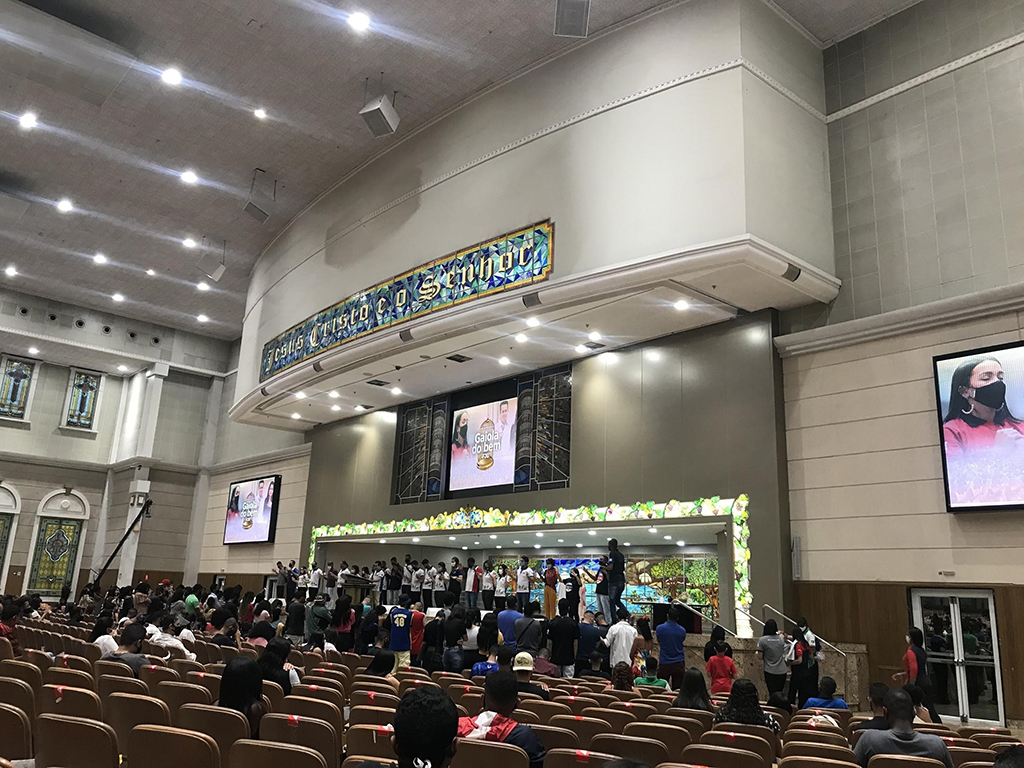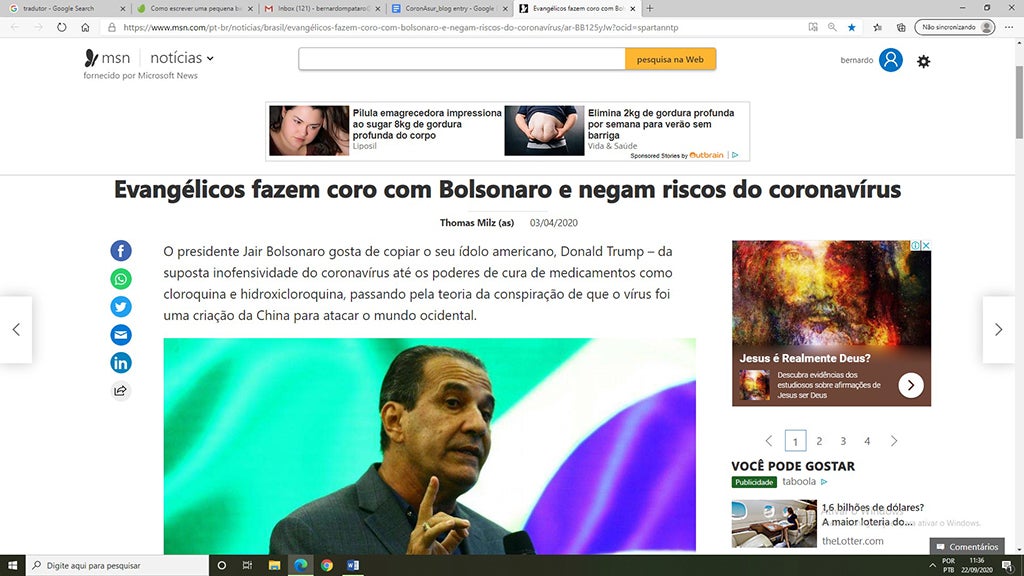Conflicting narratives of Covid-19 in Brazil: How religion influences spatial behaviours in Belo Horizonte
contributed by Gabriela Alcantara Azevedo Cavalcanti de Arruda, Daniel Medeiros de Freitas, Carolina Maria Soares Lima, Krzysztof Nawratek & Bernardo Miranda Patar, 15 October 2020
Religious identities are important factors influencing human behaviours in urban spaces. Using insights about the relationship between religion (Islam) and conceptualisation of public space as well as the relationship between social interactions and infrastructure from studies one author has conducted in Malaysia, we investigate the current response to COVID-19 in Brazil.
Brazil is the third most affected country by COVID-19 (as of September 2020). The pandemic there is a highly politicised issue, and responses to it are shaped by political allegiances. During Jair Bolsonaro’s presidency, politics in Brazil has been strongly influenced by religion, especially by neo-Pentecostal churches. Around 1/3 members of the Brazilian Congress (lower chamber of the Parliament) belong to the so-called 'evangelical caucus'. There are several conflicting narratives explaining the world impacted by COVID-19, and many of these narratives are related to particular religious positions. Non-believers and believers of 'traditional African religions' (Umbanda and Candomble), as well as Catholics and 'traditional' Protestants (non-Pentecostal) tend to accept COVID-19 as a natural disaster and follow WHO recommendations.

Fig. 1 Cathedral de Fé, Belo Horizonte. Social distancing while sitting (red tags on chairs), lack of distancing when praying at the altar. Photo by Gabriela Alcantara
Brazilian neo- Pentecostals assume a more sceptical position and tend to see COVID-19 as a challenge to their faith. Some religious narratives are intertwined with conspiracy theories presenting the pandemic as a Chinese and communist plot to take over the world. For example, the Brazilian Minister of Foreign Affairs, Ernesto Araujo named COVID-19 the “comunavirus”.

Fig. 2 “Evangelicals in chorus with Bolsonaro and dismiss the risk of coronavirus.”
The general landscape of groups and organisations in relation to WHO recommendations is complex and the differences cut across social, religious and cultural positions. However, in general, COVID-19 is interpreted along political and ideological lines - supporters of president Bolsonaro reject WHO recommendations whereas his opponents strongly support them. There are three very influential Pentecostal pastors supporting the President and his interpretation of the pandemic: Valdomiro Santiago, leader of Igreja Mundial do Poder de Deus; Edir Macedo, leader of Igreja Universal do Reino de Deus; and Silas Malafaia, leader of Assembleia de Deus Vitória em Cristo.
Our initial observations lead us to believe that Evangelical churches in Brazil can be divided into two main groups. One, that is politically oriented and the other that could be characterised as missionary oriented.
The first type, mostly supportive of Bolsonaro, sees religion more as a socio-political phenomenon and also provides believers with a wide spectrum of services, such as counselling and support for drug addicts and alcoholics. Churches following this path tend to use bigger buildings as they are more participation-oriented and simply need space for all these non-religious services. They also tend to be richer than the “missionary oriented” churches. Partly because of their congregations’ size and focus on social interactions, they often choose to ignore the World Health Organization’s recommendations on social distancing.

(Left to Right) Fig. 3 Cathedral de Fe, Belo Horizonte. Photo by Gabriela Alcantara; Fig. 4 Igreja Quadrangular, Belo Horizonte. Photo by Krzysztof Nawratek
(Bottom) Fig. 5 Locations of churches of the most popular Pentecostal denominations in Belo Horizonte (map done by Gabriela Alcantara, edited by Daniel Medeiros de Freitas)
The research we are conducting has two main perspectives: first, it looks at the issue at an urban scale (as described above); and second, it aims to understand how COVID-19 changes the lives of believers on a personal level.
There is a fascinating difference between Evangelical Christians, for whom the written text (including sacred texts) is essential; and the so-called ‘traditional African religions’ where rituals, direct contact between believers and oral tradition (no sacred texts) define their religious practice. We have interviewed members of Umbanda to better understand how the limitations in direct contact caused by spatial distancing affected their religious practice. One of them is a 22 year old female student. The Umbanda centre (Fig. 6) she attends was closed during the pandemic and she respects that decision, but she misses the intensity of the ritual - which is something she cannot reproduce at home.

Fig. 6 Fraternity Kayman, a syncretic religious centre where Umbanda believers attend
During the pandemic, she was meditating, studying, reading and practicing spiritually charged dancing. Her experiences differ from Pentecostal members of the Igreja Universal do Reino de Deus parish in Lourdes district of Belo Horizonte. Some of them had been attending the church - but not all. At the same time, they increased their dependence on radio, online interactions and social media. For example, they listen to radio station “Rede Aleluia”, 99.9fm where the pandemic is described more as a spiritual challenge than a medical one. Their Church leaders often connect COVID-19 with other contemporary problems - such as unemployment and depression - and all together these are perceived as symptoms of the malaise of the secular world. The believers we interviewed organise themselves in WhatsApp groups (called ‘families’). They compete to build the largest ‘family’, and are encouraged to attract new members weekly. They also motivate each other to attend everyday celebrations. Typical WhatsApp invitations usually end up with the phrase “the altar is not on quarantine”.
At the beginning of the lockdown, some churches remained open, against official recommendations. However on March 26th, the Federal Government published a list of essential services, including church services, allowing those gatherings to be held legally.
Every person we interviewed said faith was important for them in times of crisis, because faith “...is part of hope and gives strength to keep pursuing their goals”. To keep faith and stay connected to God even beyond church buildings, they use online group-chats and media content related to religion, but some say they do not need any particular place (like a church or a temple) to feel connected to God, as all they need is to pray. This seems to make the experience of Pentecostals different from Umbandists. While Umbandists seem to value rituals and social aspects of practicing religion, Pentecostals tend to be content with a more one-way and distant connection with the church while they practice individual prayers and have an (online) connection with the ‘family’.
The sample of Umbandists we have been in contact with is very small and demographically differs from members of Pentecostal churches (we have been in contact with individual Umbandists, not families of believers), and therefore further research is needed. At this point we hypothesize that Pentecostal churches (especially ‘missionary oriented’) are better equipped to deal with situations of pandemics and lockdown by relying more on verbal communication and less on physical presence and rituals.
We do believe that the approach we took in the multi-religious Brazilian context, where religions are intertwined with politics and create a very particular set of worldviews, will be useful in our further research in Malaysia, when focusing on Pentecostal and other Charismatic Christian churches.
Gabriela Alcantara Azevedo Cavalcanti de Arruda is an architect and an urban landscape student in the Master program in Architecture and Urbanism in Federal University of Minas Gerais, in Belo Horizonte, Brazil. Her research interests include religion, anthropology, accessibility and contemporary cities.
Daniel Medeiros de Freitas is a professor in the Urban Department at the School of Architecture and Urbanism, Federal University of Minas Gerais (UFMG). He is an author of Field of Power of the Large Scale Urban Projects (Ed.Annablume, 2017) and one of the editors of the book City-Estate-Capital: Urban restructuring and resistances in Belo Horizonte, Fortaleza and São Paulo (FAUUSP, 2018)
Carolina Maria Soares Lima is a Geographer and a Geography student enrolled in the Master of Science program at the Federal University of Minas Gerais, Brazil. Her research interests include the notion of representation and public spaces in Latin America.
Krzysztof Nawratek is a Senior Lecturer in Humanities and Architecture at the University of Sheffield, UK. He is an author of City as a Political Idea (2011), Holes in the Whole. Introduction to urban revolutions (2012), Radical Inclusivity. Architecture and Urbanism (ed. 2015), Urban Re-Industrialisation (ed. 2017), Total Urban Mobilisation. Ernst Junger and Postcapitalist City (2018) and Kuala Lumpur. Community, Infrastructure and Urban Inclusivity (co-authored with Marek Kozlowski, and Asma Mehan, 2020)
Bernardo Miranda Pataro is an International Analyst and Social Scientist, currently enrolled in the Master’s program in Sociology at the Federal University of Minas Gerais, in Belo Horizonte, Brazil. His research interests include the relationship between religion and violence; production of identities in modernity and international security.
Disclaimer: The views and opinions expressed in this article are those of the authors and do not necessarily reflect the position of the blog editorial team or the Asia Research Institute.
South Asia | Southeast Asia | East Asia | Other Places | Hinduism | Buddhism | Islam | Christianity | Other Religions

